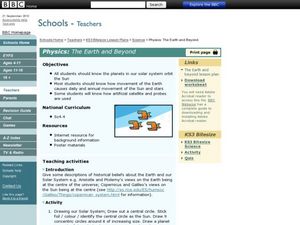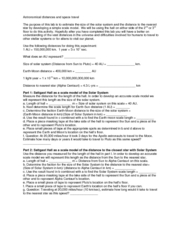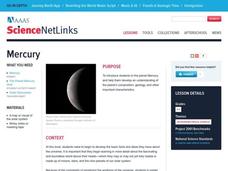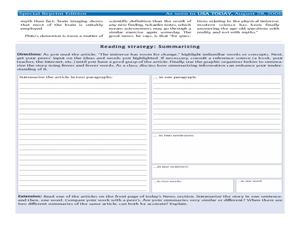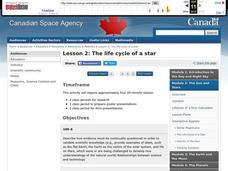Curated OER
Planet Cryptogram
In this science activity, students answer six clues about the solar system. Students use their answers to complete a table with corresponding numbers for each letter.
Curated OER
Getting to Know Saturn: The Saturn System
Learners compare and contrast Earth and Saturn's planet features. In this space science lesson, students draw a diagram of the solar system and identify the different components. They complete a Saturn system scavenger hunt and Venn...
Curated OER
Traveling the Planets!
Fourth graders research the planets and create brochures to share their information. In this planets lesson, 4th graders navigate the Internet to gather information for a brochure about an imaginary trip to their planet....
Curated OER
Gravity and the Planets
In this gravity worksheet, students read about the solar system and the effects of the gravity of the sun, the planets and the moon on the orbits of the planets. They answer three critical thinking questions about gravity.
Curated OER
The Outer Planets
In this outer planets worksheet, students determine if 15 statements about Neptune, Pluto, Saturn and Uranus are true or false. If they are false, students change the italicized words in the sentences to make the statements true.
Curated OER
Out of this World! 1
For this space science worksheet, students use reference books or Internet searches to find the answers to 15 questions about the solar system.
Curated OER
Physics The Earth and Beyond
Fourth graders will explore our solar system. In this physics instructional activity students create a model of the solar system to explore the movement of Earth, the Sun, and stars.
Curated OER
PLANETS IN PROPORTION
Middle schoolers discover scales for both the solar bodies' relative sizes and their distances from the sun. They find equatorial circumference and volumes of their solar bodies. Students apply estimation strategies and proportioanl...
Curated OER
Be A Planet
Students identify the name, order and attributes of the planets. They role play the position of planets, and draw pictures of the planets as well.
Curated OER
The Best of the Solar System (Grades 4-7)
Learners explore planetary research and become familiar with the planets and their characteristics. They compare and contrasts planets and moons.
Curated OER
Our Solar System-- Fact File
In this space science worksheet, students read facts about the solar system. Students look at the diagram showing the position of the planets. Pluto is included as a planet here.
Curated OER
Astronomical Distances and Space Travel
Students estimate the size of the solar system and the distance to the nearest star. In this space lesson plan students complete calculations and use Sattgast Hall as a scale model.
Curated OER
Astronomy and Me: Moons Over New Haven
Third graders study the features of different moons orbiting the planets. In this astronomy lesson, 3rd graders explore the different phases of the moon using an interactive online website. They compare and contrast the features of the...
Curated OER
The Sun-Earth Connection
Third graders research about the location of different planets from the sun. In this earth science lesson, 3rd graders discuss the weather in their place and identify common weather terminologies. They explain how tornadoes form and...
Curated OER
Mercury
Students study the planet Mercury and develop an understanding of the planet's composition, geology, and other important characteristics. They explore a Web resource on the planet Mercury which is the central focus of this lesson.
Curated OER
The Universe Has Room for Change
In this universe and change worksheet, students read about the demotion of Pluto as one of the 9 planets as well as other changes in science. Students summarize their reading and identify unfamiliar words in the article....
Curated OER
The Life Cycle of a Star
Students investigate the life cycle of a star and make conclusions based on evidence, research, and observation. For this lesson on space and scientific investigation, students describe the relationships between science and...
Messenger Education
Look But Don’t Touch—Exploration with Remote Sensing
Mars is home to the tallest mountain in our solar system, Olympus Mons. In this set of two activities, learners review geologic land formations through the analysis of aerial maps. They then apply this knowledge to aerial maps of objects...
University of Colorado
Are All Asteroids' Surfaces the Same Age?
There are more than 600,000 asteroids in our solar system. Pupils analyze images of two asteroids in order to determine if they are the same age. They count craters for each asteroid and compare numbers.
Space Awareness
History of the Universe
Your pupils may believe that you and their parents are the oldest things in the universe, but surprise! There are elements of the universe that are even older. Elementary scientists create a class timeline to demonstrate the...
International Technology Education Association
Tidy Up Those Sloppy Force Fields!
It is just magnetic. This resource presents the concept of Earth's and another planet's magnetic field and how spacecrafts detect them. Learners study a problem using magnetometers and participate in three experiments to come up with a...
Curated OER
Solar System Distance Activity
Students examine the distances between the Sun, planets, and smaller objects in the Solar System. They design a model using beads that shows the scale distances of the Solar System using astronomical units converted into a 10 centimeter...
Curated OER
The Discovery of the Solar System
Students explain the observed motion of the planets. The inner ones move back-and-forth across the position of the Sun, while the outer ones usually advance in one direction, but with occasional temporary reversals known as "retrograde...
Science Matters
Thermal Energy Flow in Materials
The sun sends the earth 35,000 times the amount of energy required by all of us on the entire planet, every day. The fourth lesson in the 10-part series looks at how light energy from the sun transfers into thermal energy. Scholars build...








